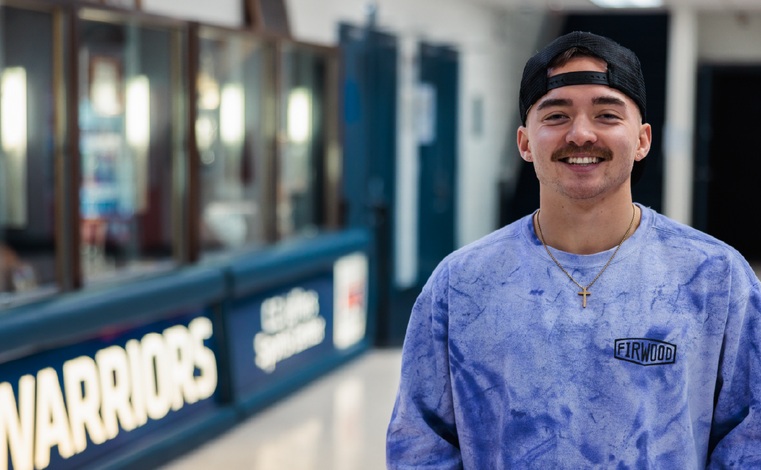
By Corban University
Salem, Oregon
“I didn’t fully realize, until I got to the hospital, that I couldn’t see.”
Markus Johnson has always been an athlete. Whether it was tennis, soccer, track, or his beloved sport of wrestling, athletics and competing have formed the fabric of his identity. And he’s always excelled, picking up nearly every sport he laid his eyes on. That is, until he could no longer see.
While Markus was working a summer construction job to help pay for college, he experienced a serious head injury that left him unconscious and convulsing on the ground for over a minute. As the EMTs loaded him into the back of an ambulance and rushed him to the hospital, all Markus remembers is bright light. He asked an EMT for his phone—the only piece of identification he had on him at the time—and was shocked when she said she had already placed his phone in his lap. He could not remember, and he could not see.
When his mother and twin brother came to visit him in the hospital, the experience became even more pronounced. “I tried to look at them and realized I couldn’t see what they looked like,” Markus says. “All I could say to them was, ‘I can’t see you,’ over and over. I started to weep and wondered if I would ever really see my family again.”
Markus was run through a battery of scans and tests to try and determine the severity of his injury, left for hours to lay in his hospital bed, waiting and wondering what his life might look like. This wasn’t the first time Markus had experienced a serious head injury. As a wrestler, the physicality of the sport often takes a toll, but severe concussions had become an unfortunate recurrence in his journey as an athlete.
“Lying there, God reminded me of a prayer that I had prayed during my first concussion,” he recalls. “I was walking down from Balyo to the dining hall. It was a crisp winter morning, and the sun was peaking its way through the trees. It was beautiful. But every time it got cold out, my eye would start watering, and it would make it difficult to see. I remember in that moment praying, ‘God, even if I couldn’t see, I would still praise You.’”
He wrestled with the reality of that prayer as, for the next eight hours, he waited sightlessly for answers from the doctors and from God. “I remember what I told You,” he prayed, “but this is tough.” All he could do was continue to pray.
He wasn’t the only one. His mother told him of everyone who had reached out and committed to praying for him—family, friends, his home church, his Corban professors and teammates. “Hearing that so many people were praying for me and interceding on my behalf was incredibly encouraging,” he says. “That support brought me the joy and hope I needed to honor that prayer. ‘Even if I can’t see, I will still praise You.’”
In the morning, Markus’ eyesight had returned, but his recovery was far from over, and his life would still be forever changed. Months full of more scans and visits to neurological specialists awaited him after he left the hospital. His dream of continuing to compete as a collegiate wrestler did not. It was a dream he was forced to leave behind in that hospital bed.
His team, however, was not ready to give up on him. “Coach Harris told me that he cared for who I was beyond what I could do,” Markus remembers. “He said, ‘You still have an important role on this team, and we want you here.’” His teammates welcomed him back with open arms. Now, he helps to prepare them to do what he has had to give up, offering encouragement and advice at every practice. “The spotlight is no longer on me,” he says. “I can’t wrestle anymore. But I’ve been able to learn that helping to push people and encourage them to go further than they thought they could is an honor and privilege.”
Even though he has stepped into a new and meaningful role on the team, the loss of competing in the sport he loves has still been a bitter pill to swallow. But in this season of bitterness and loss, Markus has been able to rediscover purpose, recontextualizing his identity not in athletics, but in Christ.
While his personal training may no longer come on the mat, at Corban, as a ministry major and now graduate student in the KAIROS program, he is pushed daily toward excellence by his professors and peers, setting his sights on ministry. “Corban is Christ focused,” he says. “My coaches and teachers have become mentors who take the time not only to take questions but to ask questions that spur me on to live a life for Jesus.”
Corban’s community has challenged Markus to think critically about his experience and to look beyond the present. One question now dominates his thoughts. “What am I willing to give my life to? Am I going to spend myself for a cause that is going to end here, or for a cause that goes into eternity?”
What is Markus training for now? “Simply to share the gospel with people who have never heard it,” he says. “God is right there with me, with us, every step of the way. Whether you’re an athlete or not, or think you have nothing left to give, we all have value because we are made in His image, and because of what He can do through us. He has a greater vision for us, and for His kingdom, than we could ever fully see or imagine.”
Disclaimer: Articles featured on Oregon Report are the creation, responsibility and opinion of the authoring individual or organization which is featured at the top of every article.

